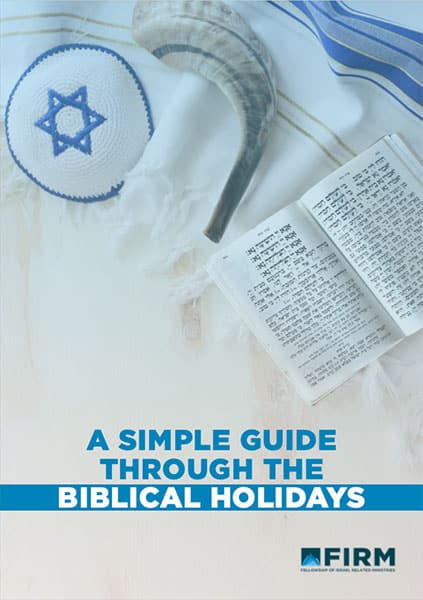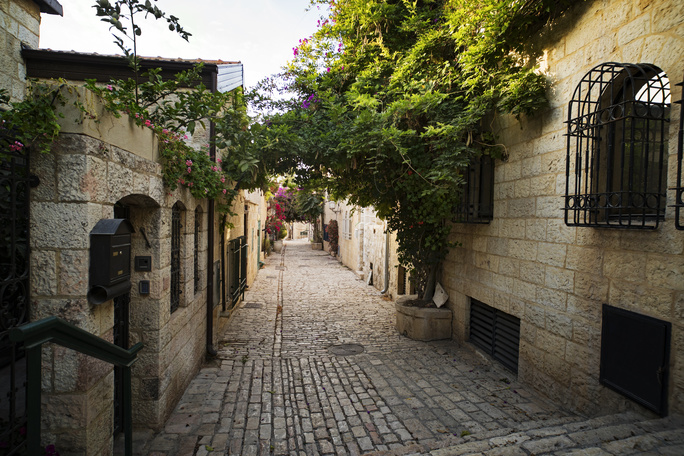Yom Kippur and Israelis
Yom Kippur is a holy day in Israeli culture. The mothers are working hard on preparing the big pre-fast dinner, and the fathers are getting ready to go to the synagogue for the holiday prayers. Meanwhile the little ones start preparing their bikes for a whole day of fun.
This is the only day of the year when the feeling in the air is that time has stopped. Everything is quiet. The streets are empty of cars, and you can hear the laughter of children, having fun riding their bikes in the empty streets. Suddenly, a loud Shofar blast is heard from the nearby synagogue and the sounds of prayers and hymns fill the streets.
A Sabra Jewish Experience of Yom Kippur
Liel Davis and her husband Yoel are directors of Yuval Arts, a platform to support and edify the next generation of Israelis to worship and honor the Lord through excellence in creative arts.
From a young age Liel’s creative flare has grown through participation in concerts, shows, song composition, singing, dance and more. Liel is also a professional sign language interpreter. She shared with FIRM what Yom Kippur signifies to her and her family:
That’s how I grew up – in a traditional Israeli home with parents who taught us the prayers and customs of the holiday. Every year we would invite our neighbors to take part in the “Seuda Mafseket” which is the “beginning meal”. It is your last meal before the 25-hour fast.
Once we finished the meal and all our guests had gone home, as a family we entered a time of reflection and prayer. Each one of us would find their own quiet place in the home. That was our Yom Kippur – the Day of Atonement.
I am a Sabra Messianic Jew – a Jew who grew up in Israel. Throughout school and army service, I shared with others about my faith in Yeshua and the good news of how our sins are forgiven by the blood of Yeshua. I’d share how only through Him we have forgiveness of our sins.
The question that always came up was whether we observed Yom Kippur like everyone else and if we took time to fast and repent. In Jewish tradition, it is believed that fasting and praying on Yom Kippur offers forgiveness for our sins and makes us clean in the eyes of the Lord.
One People of God
We have decided to observe and fast on the Day of Atonement to identify with our people and take the opportunity to pray for their salvation. Even though our beliefs are different, we are still one nation! That really was the purpose of the holiday for us, as a family. Yom Kippur held new and increased significance for us as believers.
Even today, being married with 3 children of my own, we observe Yom Kippur and see it as an opportunity to pray for our nation. We know that this day is not what will bring salvation to Israel. But it is our hope and prayer that they find a true relationship with their one and true Messiah. Through Him alone we have salvation.
Yom Kippur is also a day when we share great quality time as a family. It is a time of reflection, prayer and worship. On the Day of Atonement, we take time to refocus and redirect, with walks in the open streets, good conversations, and a lot of rest.
Yom Kippur is a special day. May the Lord bless you this Yom Kippur. May we all take time to seek the Lord’s will and draw near to Him.
How the Day of Atonement for a Messianic Israeli Pastor
Daniel Sayag has served as a pastor at Kehilat HaCarmel since 2000 and is the lead pastor since 2016. With his wife LuAnne, they live in Haifa, northern Israel.
Kehilat HaCarmel is a community of Messianic believers with the vision to reach Jews and Arabs in Israel and demonstrate the unity that Yeshua has accomplished for us. Pastor Daniel Sayag shared with FIRM what the Day of Atonement signifies for him:
Growing up in Israel during the late 1960s and 70s, life was like the fulfillment of Ezekiel 36:24: “For I will take you from the nations, gather you from all the lands and bring you into your own land.”
In our building, you could hear so many languages daily. There were families from Iraq, Morocco, Spain, Algeria, Italy, Poland, and Egypt. But even though my father grew up in Arabic-speaking Iraq and my mother in French-speaking Algeria, we spoke only Hebrew at home.
Coming of Age in Israel
After I had my bar mitzvah at age 13, it was expected of me to fast on Yom Kippur. It was very hard for me and there were times I secretly cheated. I generally tried to sleep the day away to ignore the hunger. Sometimes I would go to the synagogue, but the prayers didn’t mean a whole lot to me. I looked on it as a tradition that our family have always followed.
On the eve of Yom Kippur, the house took on a different atmosphere. My mother, of course, spent a big part of the day in the kitchen. Both the meal before the fast and the meal after the fast were important and needed to be prepared in advance. The TV was covered with a big white tablecloth, and a unique solemnness came over the house as the holiday approached.
There were specific foods that we ate before the fast. Our Moroccan neighbor would always bring us her special “Yom Kippur” soup, called harira. To this day that taste reminds me of Yom Kippur. Since all traffic stopped before sundown, the whole town would go walking in the empty streets.
During the day, my dad would spend some time in the garden, preparing pomegranates for the breaking of the fast. Sometimes we would go to the synagogue towards the end of the day, to hear the rabbi blow the shofar indicating the end of the fast. He couldn’t blow that shofar fast enough for me!
Breaking the Fast in Israel on Yom Kippur
The breaking of the fast started with baked goods that my mother had made beforehand. She added rose water and sugar to the pomegranates, so we feasted on them before the main meal came out. The main meal was always big and such a treat after a whole day of fasting.
It was only after coming to faith in Yeshua that I really understood Yom Kippur.
I had grown up singing in the synagogue every Yom Kippur, “We have sinned before You. Have mercy on us.” Suddenly, I understood the meaning of the Lamb who was sacrificed for my sins, and the Covering that He provided for me. Finally, this day started making sense.
Yeshua’s Sacrifice on Yom Kippur
Without that perfect sacrifice, I could keep doing my best year after year and never have my sins forgiven. As it is written in Leviticus 17:11:
“For the life of a creature is in the blood, and I have given it to you to make atonement for yourselves on the altar; it is the blood that makes atonement for one’s life.”
I needed a perfect sacrifice, the sacrifice of the Messiah, who made that atonement for me. After coming to faith, fasting also took on new meaning. The significance of Yom Kippur’s fast totally transformed. Now I fast for my nation… And for the rest of our people to come to know the true Yom Kippur sacrifice.
I still enjoy the old traditions, but now, the holiday has meaning to me. I love the stillness of this day. It is such a gift to have a whole day dedicated to God without any pressure to do anything else. Blessed be the Lamb who brought us atonement.
We have more stories to share with you, about celebrating Biblical holidays in the Land of Israel. Next week more FIRM local partners will share about their experiences celebrating the Feast of Tabernacles.
We are so grateful for the Body of Believers in Israel. We are learning a lot from FIRM’s local partners – and it is our joy to share it with you, too!

A Simple Guide Through the Biblical Holidays: Free PDF Download
You may know them as the “Jewish holidays,” but did you know the Bible calls them “Feasts of the LORD”?
We’ve put this guide together for you so that you have all you need to know about these holidays that God calls His own.
Articles Related to How Two Messianic Jews in Israel Experience Yom Kippur
Estimated reading time: 7 minutes

